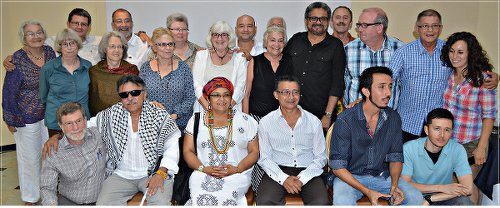

Several members of U.S. delegation with FARC representatives.WW photo: Berta Joubert-Ceci
Below is a statement issued on April 20 by a fact-finding delegation that traveled to Cuba to assess the peace talks between the Colombian government and the FARC-EP. International Action Center representatives Martha Grevatt and Berta Joubert-Ceci were part of the 33-member delegation.
Thirty-three activists traveled to Havana, Cuba, on April 11-18 to participate in a fact-finding delegation concerning the Colombia Peace Negotiations taking place there. The participants were from several U.S. states — Arizona, California, Colorado, Connecticut, Florida, Kentucky, Michigan, New York, Pennsylvania and Texas — as well as Colombia, Costa Rica and Puerto Rico. Some represented the National Lawyers Guild, the International Action Center, and the Task Force on the Americas. The delegation went under the auspices of the Alliance for Global Justice.
The current Colombian peace negotiations began in October of 2012, after representatives of the government and the Revolutionary Armed Forces of Colombia – People’s Army (FARC-EP) agreed on a framework to end the conflict and achieve a lasting peace. There are five agenda items: 1) comprehensive rural development, 2) political participation, 3) illegal drugs, 4) rights of victims and 5) the end of the conflict. The negotiators have reached partial agreement on the first three items. The current round of negotiations is addressing items four and five.
The delegation met separately with negotiators from FARC-EP and the Colombian government, as well as the sub-commissions on gender and on victims. They also met with representatives of the two guarantor countries — Norway and Cuba. As a result, the delegates are now informed about the process of the negotiations.
Estimates of the victims of the conflict range from 1.5 million to over 6 million. More than 90,000 people have disappeared, over 220,000 have been killed, 80 percent of them civilians, and as many as 6 million people have been internally displaced, the majority women and children.
The U.N. has estimated that paramilitaries with ties to the government and transnational corporations have committed over 80 percent of the casualties.
The delegation agreed that the peace process must go forward. According to delegate Pamela Brubaker, “We have become convinced, after a week of intense discussions, of the urgent need to implement a bilateral ceasefire between the negotiating parties.” Martha Grevatt spoke for the group saying, “We stand in solidarity with the people of Colombia — women, campesinos, students, unions, LGBT — who have come together in organizations and movements with a vision of a new Colombia, built on a foundation of equality, social justice and a lasting peace. This is what the majority in Colombia wants.”
As part of Workers World newspaper’s coverage marking the 50th anniversary of the liberation of…
From the PFLP Central Media Office The following statement from the Popular Front for the…
Newark, New Jersey Over 250 people, representing over 250 New Jersey endorsing community groups, attended…
Special to Workers World The following is a press release issued on April 24, 2025,…
dear Larry Krasner, we heard you sued Elon Musk over his corrupt million election giveaways…
Unions join forces against harassment and deportation of members When 200 immigrant workers – from…